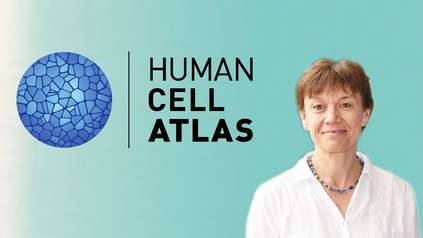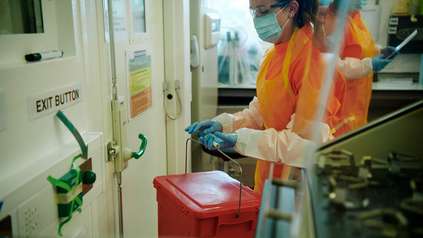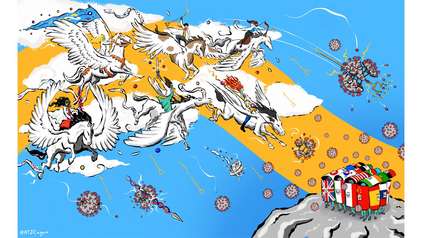Differing immune responses discovered in asymptomatic cases versus those with severe COVID-19
The largest study of its type in the UK has identified differences in the immune response to COVID-19, between people with no symptoms, compared to those suffering a more serious reaction to the virus.
Researchers from the Wellcome Sanger Institute, Newcastle University, University College London, University of Cambridge, EMBL’s European Bioinformatics Institute (EMBL-EBI) and their collaborators within the Human Cell Atlas initiative, found raised levels of specific immune cells in asymptomatic people. They also showed people with more serious symptoms had lost these protective cell types, but gained inflammatory cells. These differences in the immune response could help explain serious lung inflammation and blood clotting symptoms, and could be used to identify potential targets for developing therapies.
The research, published today (20th April 2021) in Nature Medicine, is one of the only studies to include people who were asymptomatic. This large-scale collaborative study is part of the Human Cell Atlas* initiative to map every cell type in the human body, to transform our understanding of health, infection and disease.
So far, the COVID-19 global pandemic has caused millions of deaths and many more infections worldwide. Symptoms vary widely in severity and can range from a mild cough to severe respiratory distress, blood clots and organ failure. Several previous studies have highlighted a complex immune response in the blood, but until now the full coordinated immune response and how this differs between symptomatic and asymptotic patients had not been investigated in detail.
In a new study to understand how different immune cells responded to the infection, a large team of researchers came together to analyse blood from 130 people with COVID-19. These patients came from three different UK centres (Newcastle, Cambridge and London) and ranged from asymptomatic to critically severe.
The team performed single-cell sequencing from ~800,000 individual immune cells, along with detailed analysis of cell surface proteins and antigen receptors found on immune cells in the blood. They revealed differences in multiple types of immune cells that are involved in the body’s response to COVID-19.
In those with no symptoms, the team found increased levels of B cells that produce antibodies that are found in mucus passages, such as the nose. These antibodies may be one of our first line of defence in COVID-19. However, these protective B cells were missing in people with serious symptoms, indicating the importance of an effective antibody-associated immune response at the nose and other mucus passages.
The team discovered that whereas patients with mild to moderate symptoms, had high levels of B cells and helper T-cells, which help fight infection, those with serious symptoms had lost many of these immune cells, suggesting that this part of the immune system had failed in people with severe disease.
In contrast, people with more serious symptoms leading to hospitalisation had an uncontrolled increase in monocytes and killer T-cells, high levels of which can lead to lung inflammation. Those with severe disease also had raised levels of platelet-producing cells, which help blood to clot.
“This is one of the only studies of its kind that looks at samples collected from asymptomatic people, which helps us start to understand why some people react differently to COVID-19 infection. It could also explain symptoms such as lung inflammation and blood clots. The immune system is made up of lots of different groups of cells, similar to the way an orchestra is made up of different groups of instruments, and in order to understand the coordinated immune response, you have to look at these immune cells together.”
Professor Muzlifah Haniffa, senior author from Newcastle University and Senior Clinical Fellow at the Wellcome Sanger Institute
While it is not yet understood how the infection stimulates these immune responses, the study gives a molecular explanation for how COVID-19 could cause an increased risk of blood clotting and inflammation in the lungs, which can lead to the patient needing a ventilator. This also uncovers potential new therapeutic targets to help protect patients against inflammation and severe disease. For example, it may be possible to develop treatments that decrease platelet production or reduce the number of killer T-cells produced, however more research is required.
“This is one of the most detailed studies of immune responses in COVID-19 to date, and begins to help us understand why some people get really sick while others fight off the virus without even knowing they have it. This new knowledge will help identify specific targets for therapy for patients that get sick with COVID-19.”
Professor Menna Clatworthy, senior author and Professor of Translational Immunology at the University of Cambridge and Wellcome Sanger Institute Associate Faculty
In the future, research may identify those who are more likely to experience moderate to severe disease by looking at levels of these immune cells in their blood.
This study used samples from three centres in the UK, and found that some antibody responses were similar in individuals in one geographic area compared with those at a different centre, hinting that this part of the immune response may be tailored to different variants of the virus.
“Using data from three different centres has allowed us to look at how people react to COVID-19 throughout the UK. The amount of data collected in this study has given us crucial insight into the immune reaction in various different severities of COVID-19 infection.”
Dr John Marioni, senior author and Head of Research at EMBL’s European Bioinformatics Institute (EMBL-EBI) and Senior Group Leader at the Cancer Research UK Cambridge Institute
“Along with the findings, the way this study was conducted is noteworthy, as it was a new way of doing biomedical science. By bringing different experts together, we were able to employ a divide and conquer approach, which allowed us to complete the work in extra quick time. This study required a large teamwork effort, in the middle of the pandemic when labs were being shut down. This was an incredibly rewarding study to work on, with everyone understanding the importance of the work and willing to go the extra mile.”
Professor Berthold Göttgens, senior author and Professor of Molecular Haematology at the University of Cambridge
The above video is an antibody expression landscape of severe COVID visualised as a rotating network comprised of antibody-expressing B cells organised into clonally-related clusters created by Dr. Kelvin (Zewen) Tuong, Research Associate, Clatworthy Lab, The University of Cambridge, MRC-LMB.
“This is a great example of using the Human Cell Atlas to understand COVID-19 and identify which of our cells are critical for infection and treatment. This information can be used to better understand why different people react to coronavirus in different ways. The data is openly accessible and can provide a basis for developing potential new therapies, to reduce the spread of the virus, or to protect those who start to develop severe disease.”
Dr Sarah Teichmann, senior author from the Wellcome Sanger Institute and co-chair of the Human Cell Atlas Organising Committee
More information
*The Human Cell Atlas (HCA) is an international collaborative consortium which is creating comprehensive reference maps of all human cells—the fundamental units of life—as a basis for understanding human health and for diagnosing, monitoring, and treating disease. The HCA will impact every aspect of biology and medicine, propelling translational discoveries and applications and ultimately leading to a new era of precision medicine. The HCA was co-founded in 2016 by Dr Sarah Teichmann at the Wellcome Sanger Institute (UK) and Dr Aviv Regev, then at the Broad Institute of MIT and Harvard (USA). A truly global initiative, there are now more than 2,000 HCA members, from 75 countries around the world. https://www.humancellatlas.org
Publication:
Emily Stephenson, Gary Reynolds, Rachel A Botting, Fernando J Calero-Nieto, Michael D. Morgan, Zewen Kelvin Tuong, Karsten Bach, Waradon Sungnak, et al. (2021) The immune response in COVID-19 detailed by single cell multi-omics. Nature Medicine. DOI: 10.1038/s41591-021-01329-2
Funding:
This supported by Wellcome Human Cell Atlas Strategic Science Support, Cancer Research UK, the European Research Council, Wellcome, the Chan Zuckerberg Initiative (CZI), the Medical Research Council, Aging Biology Foundation, UK-CIC (the UK Coronavirus Immunology Consortium), and the National Institute of Health Research. Please see the paper for full funding details.





